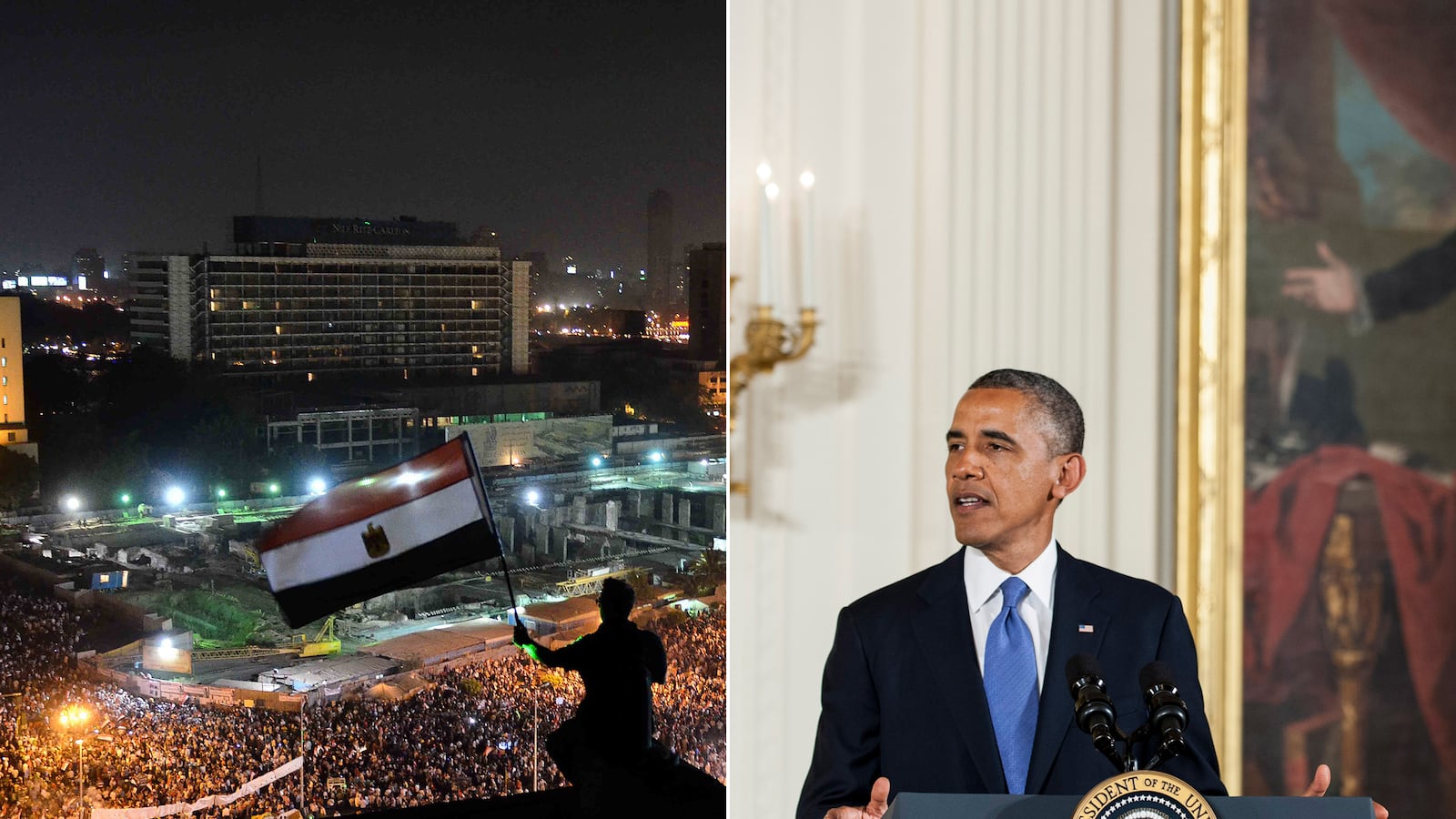President Obama’s first presidential visit to sub-Saharan Africa last month was nothing so much as an afterthought, given that both former secretary of state Hillary Clinton and his former U.N. ambassador, Susan Rice, had during his first term talked about the region nonstop but evoked nothing from their boss. As it happens, Obama’s heart was never in Africa. Pick up again his indurate book, Dreams from My Father, and see the harsh truth.

This is something one cannot say about his attitude to the world of Islam, from the deserts beyond Baghdad to the sands of the western Maghreb. But one has only to think back to Obama’s Cairo oration in the fifth month of his presidency to realize how little he grasped of the Arab predicament, theirs and his, then, now, for the future. Four years later, he has absented himself utterly from the quagmire in which nearly 90 million Egyptians find themselves. The administration continued the flow of arms to the country’s military but did nothing to push the regime of the Muslim Brotherhood to revive the birth-control programs they had abruptly aborted after Mubarak’s fall—which drastically impedes the country’s struggle against poverty. Rumors spread from Foggy Bottom after the coup that arms shipments may be curtailed. They won’t be, and they shouldn’t.
As long as he could maintain his fantasies about Egypt, which means as long as there was literally no blood flowing in the streets, the president could pretend that tout va bien. Anyway, nobody roused him from his sleep. And, in any case, he was liquidating the one war he had pumped up as the good war—the battle in Afghanistan. There had been no Cindy Sheehan to torment him, George W. Bush-style, at his doorstep for America’s 2,000 dead in the decades-long battle between frenzied Islamicists and a perfidious regime. And no one posed to him John Kerry’s famous and brave question: “how do you ask the last American soldier to die for a disastrous mistake?”
Egypt has for the moment robbed the headlines from Syria, although the Syrian fratricide is still the real measure of Arab politics. Even in From Beirut to Jerusalem, a book written more than 25 years ago, Thomas L. Friedman admits that “Hama Rules” were the paradigm of Arab politics. (Hama was a Sunni town that Hafez al-Assad, Bashar’s father, leveled with perhaps 25,000 dead whom almost nobody outside the region noticed were gone.) Alas, no Muslim massacre of Muslims (as occurs almost daily in Iraq and a little less often in Pakistan) or of Christians (as in Nigeria) attracts public dissent or protest or, for that matter, more than a back-page notice in the press. There is hardly a day when some group of Muslims is not murdered by another group of Muslims. The favored locale for what James Joyce called “death happenings” is a mosque, which guarantees a substantial number of religiously certified victims. But a market or school bus will do. These were the favored targets of Palestinian terrorists before Israel set up checkpoints between the territories and the Jewish state proper.
Targeting fellow Arabs is what Arabs have been doing for many decades. In 1938, George Antonius—Lebanese born, Egyptian raised, British schooled, Palestine domiciled—published a book called The Arab Awakening, arguing the essential unifying nationalism of the otherwise religiously sundered Arabs. The volume became their bible against Zionism. It was popular in England and the United States. It even attracted the support of wealthy Judeaophobic Americans, who influenced Nicholas Murray Butler, president of Columbia University, to offer Antonius a job. Col. Gamal Abdel Nasser took from the book’s tenets his ambition to unite the Arabs, finally joining his own country, Egypt, with Syria and North Yemen in the United Arab Republic. The union lasted all of three years. Then he initiated the disastrous Six-Day War against Israel. Such armed action with Israel is now utterly unfeasible. So the Arabs are driven to fantasy and metaphor. The contemporary Muslim activist philosopher Tariq Ramadan, for example, picked up the “awakening” motif in his recent book with Antonius’s old title. But in the months since publication, his expectations have been overwhelmed by sectarian bloodshed and military reflex.
Which brings us to the president’s first foreign-policy hallucination in office. It was that Recep Tayyip Erdogan, the prime minister of Turkey, was a democrat, a liberal, a tolerant Muslim, an eager peacemaker between the Palestinians and Israel. Obama also saw him as an intimate friend with whom he could and would profitably confer again and again. No personal judgment by the president was so wrong. Since Obama doesn’t really confide in the American people—well, yes, he does send emissaries out to tell us how much Bibi Netanyahu vexes him—he’s been silent about the Turkish PM. But Erdogan’s own confident political universe is no longer. Turkey will not be admitted to Europe. Turkey’s self-evident prank of trying to break Israel’s blockade of Gaza was just that, a self-evident prank. The events of recent weeks demonstrated that Erdogan was trying to impose religious observance on secular neighbors and neighborhoods. Erdogan will probably not be elected president, a post he has craved. And his machinations with the judiciary, the signpost of his cynicism, are bound to be aborted. He made a grand rhetorical play against Assad in the first two years of the Syrian rebellion but all of it came to nothing. Like Obama’s later and lesser forays against Assad.
All that is left of Obama’s diplomacy in the Middle East is John Kerry’s stubborn and heroic effort to keep its Israel-Palestinian scope alive. Despite the rhetorical mischief coming out of certified troublemakers in the Israeli government, Netanyahu is ready to go not perhaps the extra mile, but the extra half mile. The Palestinians, however, are aware that all of their Arab brothers—there are no relevant sisters!—are otherwise engaged. This is the moment of truth for the Arabs of Palestine, perhaps the last moment. They will have to sign on to what Israel will give up. Obama cannot help them. And it might just be that, after all of the soppy rhetoric about the disinherited people, he also doesn’t really care.






